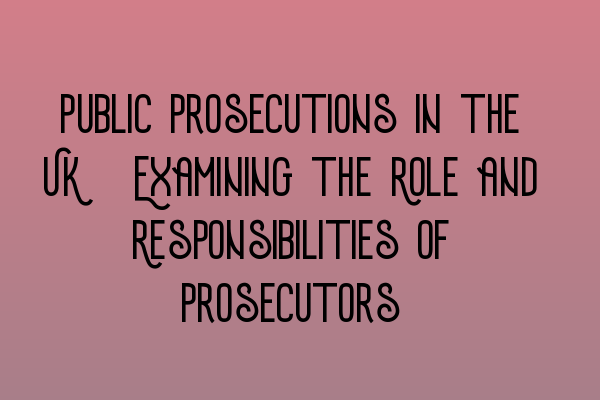Public Prosecutions in the UK: Examining the Role and Responsibilities of Prosecutors
In the criminal justice system of the United Kingdom, prosecutors play a crucial role in upholding justice and ensuring that criminals are held accountable for their actions. Public prosecutions are conducted by Crown Prosecution Service (CPS) on behalf of the state. In this article, we will delve into the specifics of the role and responsibilities of these prosecutors, shedding light on the intricate workings of the criminal justice system.
The Role of Prosecutors
Prosecutors, also known as Crown Prosecutors, are legal professionals appointed by the Crown Prosecution Service to represent the state in criminal proceedings. Their primary goal is to bring offenders to justice and safeguard the public interest. They act as the link between law enforcement agencies, victims, and the court system.
Prosecutors have the responsibility of reviewing evidence provided by the police or other investigative agencies. They meticulously analyze the evidence to determine if there is a viable case to be presented in court. In this capacity, they exercise their professional judgment to assess the chances of securing a conviction and whether it is in the public interest to pursue the case.
Once prosecutors decide to proceed with a case, they draft charges and present them to the court. They also have the power to negotiate plea deals with the defense, where appropriate, and make recommendations for sentencing.
Responsibilities of Prosecutors
The responsibilities of prosecutors are diverse and demanding. They involve:
- Thoroughly evaluating the quality and admissibility of evidence
- Ensuring that the accused’s rights are respected throughout the legal process
- Communicating effectively with victims, witnesses, and law enforcement agencies
- Advocating for the state in court and presenting evidence to support the charges
- Arguing legal issues and objections raised by the defense
- Reviewing case law and legal precedents to inform their arguments
- Collaborating with other legal professionals, including barristers and judges
- Maintaining professional ethics and integrity in all their actions
Prosecutors are bound by the principles of fairness and impartiality. They have a duty to act in the best interest of justice and not solely for the purpose of securing a conviction. Their role is to present the facts and evidence objectively, allowing the court to make a fair and informed decision.
Importance of Public Prosecutions
The role of public prosecutions in the criminal justice system cannot be overstated. Prosecutors act as a gatekeeper, ensuring that cases proceed to trial only if there is sufficient evidence and it is in the public interest. This prevents unnecessary burden on the court system and protects individuals from unwarranted prosecution.
Furthermore, public prosecutions help maintain law and order in society. By holding offenders accountable for their actions, prosecutors contribute to the deterrence of criminal behavior. They also provide closure and justice to victims, offering a sense of vindication and healing.
To prepare for a career in criminal law practice in the UK, aspiring solicitors are required to pass the SQE exams. The SQE 1 Practice Exam Questions and SQE 1 Practice Mocks FLK1 FLK2 are valuable resources for individuals seeking to enhance their knowledge and understanding of criminal law principles.
In addition, SQE 2 Preparation Courses and SQE 1 Preparation Courses provide comprehensive study materials and guidance for those preparing for the SQE exams. Stay up to date with the SRA SQE Exam Dates to plan your studies effectively.
In conclusion, prosecutors play a vital role in the criminal justice system of the UK. Their responsibilities encompass evaluating evidence, representing the state in court, and upholding the principles of justice. Public prosecutions contribute to maintaining law and order, protecting the public interest, and ensuring that justice is served.
